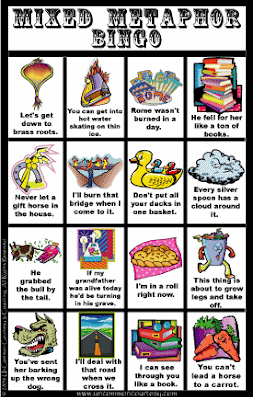Saturday, April 16, 2011
Blog Assignment 14- Special Assignment- Metaphors
Recently I read a blog post called "Don't Let Them Take The Pencils Home". In this post, pencils were used as a metaphor for computers. Unfortunately, I missed this metaphor. I thought that the author was using pencils to show the folly of one educator's way of thinking. I assumed that the author chose to talk about how pencils could be blamed for problems in the public school system to show how some educators would rather come up with a lame excuse than admit their own shortcomings. The reason that I think I missed this metaphor is that I was not thinking deeply enough about the post. My mind immediately focused on the ridiculous character portrayed in this piece who believed that pencils could be causing the problems in education today. I did not look and the bigger picture and connect the writing with the use of computers and technology. This is surprising since this class is all about technology.
I am used to searching for metaphors while reading literature. This week in my American Literature class, I came across several metaphors. In the poem "Marks" by Linda Pastan, Pastan uses a metaphor to compare the teacher/student relationship and the family/mother relationship. This metaphor is used to show how families can be overcritical of their mothers by giving them harsh "grades" about their performances as mothers. In the short story "Shiloh" by Bobbie Ann Mason, the civil war is used as a metaphor for the deteriorating relationship between a husband and wife who are considering a divorce. In "The Things They Carried" by Tim O'Brien, the heavy backpacks and supplies that soldiers were required to carry during the Vietnam War are used as a metaphor for the emotional burden of being involved in warfare. In "The White Porch" by Cathy Song, a woman's hair is used as a metaphor for her sexuality. There are many more examples that I could cite of metaphors that I have found in literature. The thing about metaphors is that you have to be on the look out for them. There are some common metaphors which are fairly obvious that people encounter every day. For instance, when you say "That's the pot calling the kettle black" you really mean that a person is being hypocritical. However, extended metaphors used in writing can be a little bit more tricky to spot. In the future, I will try to keep an eye out for metaphors at all times. I hope that I will not miss another obvious metaphor like I did when I read the Johnson assignment.
I think that educators can help their students understand metaphors by discussing the many metaphors that we encounter on a daily basis. Metaphors are everywhere! Metaphors are used in everyday conversation, literature, songs, movies and television shows. If educators can teach children how to look for metaphors, they will be able to understand things on a deeper level. We use metaphors in order to enhance understanding and add meaning to things. For example, saying "he's not the sharpest tool in the shed" conveys more meaning than simply saying "he's not very smart". This metaphor makes the connection to an everyday object. This adds a whole new layer of meaning because people can relate to this analogy. The example I used earlier which compared divorce to a civil war adds deeper meaning to our understanding of the nature of separation between two parties which are so closely connected. I think that metaphors are a great thing and educators should make sure that their students have an understanding of them.
Subscribe to:
Post Comments (Atom)

No comments:
Post a Comment